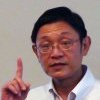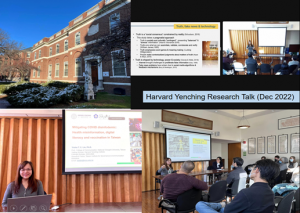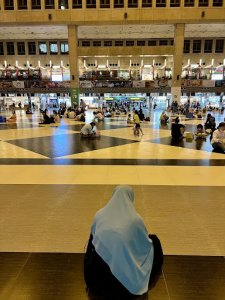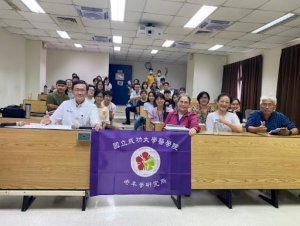
The core of the disputes lies in the term Sinicization. For example, when a Westerner reads a Qing history book, he or she may question the justification for Sinicization, or the “Chineseness,” of the Qing dynasty, as has long been the stance of official Chinese historiographers. These questions bring into doubt the Chinese orthodox view of non-Han minority rule of China.
On this issue, my tentative suggestion is to substitute the term “Hybridization” for Sinicization. The Han Chinese and non-Han minorities have interacted since the prehistoric era, and they have witnessed a cycle of peace and conflict well into the 21st century. The purity of Chinese blood, therefore, is simply not a question. By the same token, Chinese culture is characterized by a rich blend of Han and non-Han elements. This suggestion, or new approach, may not be accepted by most of my fellow countrymen, be they Taiwanese or Chinese, especially history professors. Then, what is the merit of my effort? If an increasing number of people agree to disagree on disputes like the one above, then I believe that a constructive dialogue is likely to take place between the two camps.
According to Prof. Lu Yang of Peking University in Beijing, among contemporary U.S. academics, only two scholars are fully able to use Manchu documents directly to study the history of the Qing. They are Prof. Mark Elliott, who is chair of Harvard’s PhD Committee in History and East Asian Languages as well as a key figure of the “New Qing History” school, and Prof. Nicola Di Cosmo of the Institute for Advanced Study at Princeton.
Prof. Lu Yang is half right. There are another two Americans I know of who have written on the subject of Manchu language and culture, and both have previously held teaching positions in this regard but somehow shifted to other interests. One is Prof. Steve Durrant of the University of Oregon (retired), who co-authored “The tale of the Nišan shamaness: A Manchu Folk Epic.”The other is Dr. Gertraude Roth Li, who wrote “Manchu: A Textbook for Reading Documents” andtaught Manchu at the University of Hawaii and at the University of California at Berkeley a couple of years ago.
Let me be clear about the reason why I would like to have a renewed look at “New Qing History” at this moment:
First, it is high time that we reiterate the value of Manchu in connection with the use of original Qing history materials. Actually, long before the appearance of the American-led “New Qing History” movement, scholars on both sides of the Taiwan Strait, together with their counterparts in Japan, South Korea, Russia, Italy, Germany, etc. had already made good use of Manchu archives.
Second, as previously mentioned, I strongly support more dialogue between the two camps. To this end, a younger generation of scholars, either in Taiwan or in China, are required to do two things. They need to strengthen their proficiency in English to the extent that they can fully express themselves in their publications or discourses. Also, they need to fix the tradition of Chinese historiography so that they can be more flexible in their stance and be more open-minded in dealing with their foreign counterparts.
Third, I wish to urge the “Chinese camp” and its followers to retell Chinese history by connecting it with world history. Unlike older generations, a new generation of scholars across the Taiwan Strait would be in a better position to view Chinese history from the angle of world history. Under such a proposition, for example, the role of the Manchu rulers of China might have been different from the claims that the “Chinese camp” has made. By so doing, younger scholars would create more convincing arguments and have constructive exchanges in the future with their foreign counterparts.
Fourth, I wish to urge the “Chinese camp” to repackage Chinese history by coining powerful new phrases. Instead of using Zhuang, Manchu, Mongolian, Uighur, Tibetan, etc., try to use Zhuang Chinese, Manchu Chinese, Mongolian Chinese, Uighur Chinese, Tibetan Chinese, etc. in order to show the multi-ethnic and multicultural elements of Chinese society, much like the politically correct wording, such as African-American, Asian-American, etc., used daily by Americans. My suggestion may not be sound, but it is time that Chinese history was given a brand-new look by all means.
Fifth, I wish to encourage more in the field to study Manchu. Here, I wish to point out that Chinese and Taiwanese academics have the edge over foreigners when it comes to the study of Manchu, which has a huge borrowing from Chinese. Besides, Manchu classes both at beginner and at advanced levels are more easily available in Taiwan and China than elsewhere in the world. As far as I am concerned, I benefited a lot from Manchu classes, which are offered tuition-free at the National Palace Museum in Taipei.
What is worth noting here is that students taking the examinations for entry into the Institute of History at National Taiwan University in 2010 were required to comment on the following question: “‘Sinicization’ is not sufficient enough to expound on the success of the Qing dynasty as an empire in Chinese history.”Tests like this are useful in changing the way in which both students and teachers deal with education. Obviously, “New Qing History” has already cut a swath through history education at Taiwan’s universities. I certainly have no way of knowing how professors scored the students who answered that question on the test. If professors were open-minded at the moment of scoring and concerned only about the analytical skills and historic views of examinees, that’s fine. Otherwise, history education in Taiwan would worsen. With this in mind, I wish to encourage direct exchanges between the “Chinese camp” and the “New Qing History camp” to create a forum for debate, not a fight.
Students of history, particularly East Asian history, and even those of Chinese studies, who accept the above stance and would like to be more open-minded and linguistically adept, will probably have more job openings in the future than those who do not accept it. Besides, students in Taiwan who are tolerant of different views and are armed with the necessary language skills will be better able to communicate with foreign experts either on the Internet or in face-to-face discussion.
As for me, I studied Manchu and Sibe as a graduate student several years ago. In the summer of 2011, I traveled to Ili and Urumchi, two cities in Xinjiang where many Sibes live, to carry out my Sibe research project, which later facilitated completion of my Ph.D. dissertation. No sooner had I received my Ph.D. in early 2014 that I thought of going to the U.S. for short-term study as the U.S. is home to “New Qing History camp.” In June 2014, as a recipient of thePan Sy-Zuan Scholarship, I traveled to Shenyang, a city in northeastern China, and completed a paper on how they tried to protect Manchu from oblivion. Three months later, I went to Shenyang again for a two-day conference at the invitation of the Shenyang Imperial Palace Museum and presented a paper on the significance of Manchu inscriptions on the imperial buildings in Shenyang and Beijing.
In 2015, under the aegis of a Fulbright grant, I went to Harvard University to serve as a visiting scholar at its Fairbank Center for Chinese Studies. I spent most of my three month tenure reading a lot of the rare Manchu manuscripts at the Yenching Library. Thanks to this learning experience, on the one hand, I got to know several influential scholars in the field of Manchurology, such as Prof. Mark Elliott, director of the Center, and Prof. Stephen Wadley of Portland State University, Oregon. My Harvard experience also is of great use in further strengthening my proficiency in Manchu reading.
One day, while reading at Yenching Library, I was seriously considering compiling a new Sibe-Chinese dictionary in the future. With much training in linguistics and a full knowledge of Manchu and Sibe, I am confident that I can complete this new, challenging venture, which will be a major part of my next project.
A few examples listed here are enough to show the features of the dictionary in question: It would contain some Manchu words not found in all extant dictionaries, such as“songkon”in šu songkon asari (wen shuo ge, one of the seven buildings which used to house si ku quan shu). It would also contain frequently used, Sibe-coined words which can be regarded as an extension of Manchu:lala tatambi(to make trouble), ehe tatambi (same as “lala tatambi”), fulehe tatambi (to build a foundation), use tarimbi (to sleep around, said of men), ehe tarimbi (to do evil which will backfire in the future), am gurun (adults), nikan gurun (Chinese people), haha gurun (men), hehe gurun (women), etc. Moreover, the dictionary would provide colloquial pronunciations, such as niyalma (person) which is pronounced [nan]. Compiling such a dictionary will necessitate hard work and a lot of time, but it is worth a try on my side.
Something unusual happened to me in the final weeks of my stay at Harvard. At the invitation of Prof. Stephen Wadley, mentioned above, I flew to this major Oregonian institution on the West Coast and gave a speech with the same title as this article. Audience responses were multiple, with some challenging my views, others being full of encouragement, and still others expressing their opinions strong enough to make myself ponder deeper on my speech.
My heartfelt thanks go to Prof. Wadley for giving me this unusual opportunity and an unforgettable two-night home stay warmed by a fireplace. My thanks go also to Prof. Mark Elliott, whose superb Center offered me an unforgettable academic experience-plus fine coffee and food.







